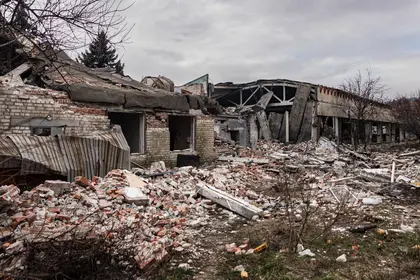When Yuri Ponomarenko first came back to his home village in eastern Ukraine several weeks ago, he found it almost completely deserted, its silence broken only by the meowing of famished cats.
Little has changed since then in Bogorodychne, highlighting the rough road ahead for front-line villages looking to make a full recovery now that the Russians have been pushed out.
JOIN US ON TELEGRAM
Follow our coverage of the war on the @Kyivpost_official.
"I think I'm the first one to come back and live here," the 54-year-old told AFP this week, a blue beanie hat pulled down over his emaciated face.
His only other company, apart from the cats, are "a mother and a son who never left," he added.
A year ago, Bogorodychne was home to roughly 1,000 people, but nearly every last one has fled, some even before the first shots were fired in February.
Foreseeing heavy combat, Ponomarenko sent his own wife and daughter to Poland in the run up to the war.
He too ended up fleeing when hostilities drew closer, hopping from one town to another in eastern Ukraine in search of a safer place.
Bogorodychne ended up changing hands several times until the Russians finally left the village for good in September.
Upon hearing it had been liberated, Ponomarenko decided to return.
"I felt that I needed to come back, I just had to," he said.
At first, it was only possible to return with soldiers, as land mines littered the landscape.
But a week ago, he decided to move back full-time to the place where he has spent most of his life.

What if Russia Wins?
The transition has not been easy.
For now, he has sought temporary accommodation in a small room in another building, where he uses bricks to trap in heat.
Inside this ad hoc shelter, the thermometer reads 18 degrees Celsius (64 degrees Fahrenheit), offering some respite from the icy wind blowing through the ruins outside.
- Ghosts -
Beyond Ponomarenko's home, the devastation of war is everywhere in Bogorodychne.
The blue walls of the church that used to overlook the village are riddled with shrapnel.
Its golden domes have fallen down.
In streets covered in debris and wrecked cars, even animals resemble ghosts -- stray dogs endlessly circle around visitors without ever letting out a bark.
One particularly unfortunate cat, whose head was stuck in a glass jar with sharp edges, meows desperately before cowering in fear.
The view inside those structures that are still standing is not much better.
The floor of the school, for instance, is covered in damaged desks, scattered books and military rations.
Russian soldiers appear to have used the school as a makeshift base, leaving a filthy mattress and a uniform behind.
Other Russians settled in the garage that belonged to Viktor Skylar's brother.
Skylar, a 50-year-old with piercing blue eyes, came back this week with his wife and young daughter to retrieve what could be salvaged from his brother's home.
"These Russian pigs... I guess there were three of them," he says, pointing at the ground covered in discarded ration tins.
Everything in the house had been toppled and destroyed -- or looted.
Skylar laments that soldiers stole a television, a microwave, some clothes and a woodchipper.
But those losses all paled in comparison to what he found in the garage: the corpse of the family's beloved dog, apparently killed by the soldiers.
"It was a Saint Bernard," Sklyar says, visibly distraught. "Our Saint Bernard."
You can also highlight the text and press Ctrl + Enter






